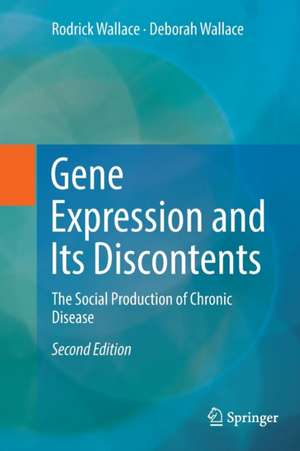Gene Expression and Its Discontents: The Social Production of Chronic Disease
Autor Rodrick Wallace, Deborah Wallaceen Limba Engleză Paperback – 29 apr 2018
| Toate formatele și edițiile | Preț | Express |
|---|---|---|
| Paperback (2) | 782.27 lei 6-8 săpt. | |
| Springer International Publishing – 29 apr 2018 | 782.27 lei 6-8 săpt. | |
| Springer – 29 noi 2014 | 1526.50 lei 6-8 săpt. | |
| Hardback (1) | 1104.84 lei 6-8 săpt. | |
| Springer International Publishing – 21 dec 2016 | 1104.84 lei 6-8 săpt. |
Preț: 782.27 lei
Preț vechi: 823.44 lei
-5% Nou
Puncte Express: 1173
Preț estimativ în valută:
149.70€ • 162.56$ • 125.75£
149.70€ • 162.56$ • 125.75£
Carte tipărită la comandă
Livrare economică 22 aprilie-06 mai
Preluare comenzi: 021 569.72.76
Specificații
ISBN-13: 9783319838939
ISBN-10: 3319838938
Ilustrații: XIII, 344 p. 52 illus.
Dimensiuni: 155 x 235 mm
Greutate: 0.5 kg
Ediția:Softcover reprint of the original 2nd ed. 2016
Editura: Springer International Publishing
Colecția Springer
Locul publicării:Cham, Switzerland
ISBN-10: 3319838938
Ilustrații: XIII, 344 p. 52 illus.
Dimensiuni: 155 x 235 mm
Greutate: 0.5 kg
Ediția:Softcover reprint of the original 2nd ed. 2016
Editura: Springer International Publishing
Colecția Springer
Locul publicării:Cham, Switzerland
Cuprins
Introduction.- 1. Toward new tools.- 2. Models of development.- 3. Groupoid symmetries.- 4. Epigenetic catalysis.- 5. Developmental disorders.- 6. An interim perspective.- 7. The obesity pandemic in the US.- 8. Coronary heart disease in the US. - 9. Cancer: a developmental perspective.- 10. Autoimmune disorders.- 11. Demoralization and obesity in Upper Manhattan.- 12. Death at an early age: AIDS and related mortality in New York City.- 13. Mental Disorders I: Western atomism and its culture-bound syndromes.- 14. Mental Disorders II: Psychopathology and sleep.- 15. Diabetes and Thyroid Cancer in Manhattan's Chinatown.- 16. Right-To-Work Laws and Alzheimer's Disease.- 17. Stress as an Environmental Exposure.- 18. Final Thoughts.- 19. Mathematical Appendix.
Notă biografică
Rodrick Wallace PhD is a research scientist at the New York State Psychiatric Institute, received his B.S. in mathematics and a Ph.D. in physics from Columbia University.. A recipient of an Investigator Award in Health Policy Research from The Robert Wood Johnson Foundation. He has published many papers adapting quantitative methods from population, community and ecosystem ecology to the theoretical and empirical analysis of problems of public health and public order. Recently he has attempted to adapt methods from information theory to the study of evolutionary process in medical sociology, biology and economics.
Textul de pe ultima copertă
This book describes how epigenetic context, in a large sense, affects gene expression and the development of an organism, using the asymptotic limit theorems of information theory to construct statistical models useful in data analysis. The approach allows deep understanding of how embedding context affects development. We find that epigenetic information sources act as tunable catalysts, directing ontogeny into characteristic pathways, a perspective having important implications for epigenetic epidemiology. In sum, environmental stressors can induce a broad spectrum of developmental dysfunctions, and the book explores a number of pandemic chronic diseases, using U.S. data at different scales and levels of organization. In particular, we find the legacy of slavery has been grossly compounded by accelerating industrial decline and urban decay. Individual chapters are dedicated to obesity and its sequelae, coronary heart disease, cancer, mental disorders, autoimmune dysfunction, Alzheimer’s disease, and other conditions. Developmental disorders are driven by environmental factors channeled by historical trajectory and are unlikely to respond to medical interventions at the population level in the face of persistent individual and community stress. Drugs powerful enough to affect deleterious epigenetic programming will likely have side effects leading to shortened lifespan. Addressing chronic conditions and developmental disorders requires significant large-scale changes in public policy and resource allocation.
Caracteristici
Illustrates the significant implications for epigenetic epidemiology, in particular for understanding how environmental stressors, in a large sense, can induce a broad spectrum of developmental disorders in humans Examines a class of probability models describing how epigenetic context affects gene expression and organismal development Authored by expert in the field Includes supplementary material: sn.pub/extras
